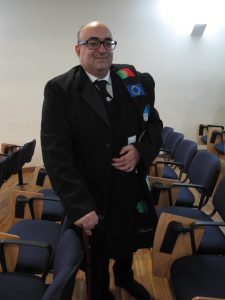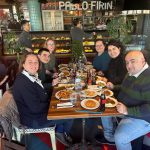
An i-HETP TPM (transnational project meeting) in the life of an academic researcher
Olá, sou o David Sotto-Mayor e encontro-me em Muğla, na Turquia, onde acabei de liderar a segunda TPM (reunião transnacional de projeto) do i-HETP.
Podem pensar que isto é ótimo para mim. Então, o que é isso do i-HETP e como vim parar aqui, a mais de 4600 quilómetros de distância, para coordenar uma reunião?
Tudo começou em 2017, quando me matriculei no curso de licenciatura em GSC… Na realidade, talvez tenha começado 41 anos antes, mas essa parte é menos relevante para vocês.
No final do primeiro semestre de 2018, foi-me diagnosticado um tumor na base da língua. Terminei o ano letivo hospitalizado, enfrentando grandes dificuldades. Após a remoção do tumor, fiquei com sequelas neurológicas permanentes, incluindo vertigem constante, que naquela época me impedia de ler ou andar. Desde a visita encorajadora do professor Georg no hospital até às facilidades dadas para estacionar na área de deficientes – apesar de não ter uma deficiência motora oficialmente reconhecida até à eminente renovação do meu atestado de incapacidade, cinco anos depois – recebi um apoio incrível. Com a ajuda do Gabinete de Apoio ao Estudante, que me revelou direitos que desconhecia, consegui concluir o curso, beneficiando da inclusão sem sequer saber o que isso significava, e terminei com uma média de 18,15, um recorde na Atlântica que felizmente foi superado pela minha aluna e agora colega, Patrícia.
Durante o meu mestrado em GSTI, também na Atlântica, ouvi falar pela primeira vez em inclusão e associei-a imediatamente ao apoio que recebi. Inspirado pelo filme “Favores em Cadeia”, decidi que a minha dissertação de mestrado se focaria na inclusão de estudantes com incapacidades no ensino superior. Durante a minha investigação, descobri que a maioria dos professores sentia falta de preparação para ensinar alunos com incapacidades visíveis, o que me preocupou ainda mais. Além disso, muitos não reconheciam as necessidades especiais de estudantes com incapacidades menos óbvias. Uma aluna com incapacidade geniturinária partilhou comigo que durante os exames escritos, se precisasse de ir à casa de banho, as suas provas ficariam como estavam, pois existia o receio de fraude.
Isto levou a duas linhas no capítulo de Investigação Futura da minha dissertação, em que previa a formação dos professores do ensino superior em metodologias pedagógicas inclusivas, e à decisão de focar futuras pesquisas académicas neste tema.
Estas linhas chamaram a atenção da Dra. Natália do Espírito Santo. Quando estava a terminar a minha participação no meu primeiro projeto na equipa Atlântica Projects, ela desafiou-me a desenvolver essas ideias numa candidatura a um projeto Erasmus+ KA2 que eu coordenaria quando este fosse aprovado. Daí surgiu o convite aos mesmos parceiros do projeto TSEMY, seguindo o princípio de que “em equipa que ganha não se mexe”.
Senti um enorme orgulho e satisfação pessoal por poder trabalhar em algo pelo qual gostaria de vir a ser reconhecido. Nesta reunião, planeámos a revisão dos módulos de formação já desenvolvidos e o início do programa piloto já a partir de 1 de Março.
Com a minha condição, aprendi a não dar nada por garantido, mas levo desta reunião a certeza de que este programa será útil para os meus colegas professores, beneficiando assim os seus alunos com e sem incapacidades.
Sinto ao sair da reunião a segurança de que mesmo que eu um dia não consiga continuar a contribuir para o seu desenvolvimento, este projeto será sempre levado a bom porto. Até porque de Portugal, apesar da diferença horária, participou a colega Professora Doutora Cláudia Costa, que tendo também um interesse académico relevante nesta área de investigação tem sido uma colega e amiga com contributos académicos e motivacionais inquestionáveis.
Resumindo a reunião a uma palavra: Gratidão. Desde a minha própria inclusão, à oportunidade para criar o projeto, e ao apoio de toda a equipa e instituição por trás da minha presença nesta reunião.
**************
Hi, I’m David Sotto-Mayor and I’m in Muğla, Turkey, where I’ve just led i-HETP’s second TPM (transnational project meeting).
You might think this is great for me. So what is this i-HETP and how did I end up here, over 4600 kilometers away, to coordinate a meeting?
It all started in 2017, when I enrolled on the Systems Management and Computing degree course… In reality, it may have started 41 years earlier, but that part is less relevant to you.
At the end of the first semester of 2018, I was diagnosed with a tumor at the base of my tongue. I ended the school year in hospital, facing great difficulties. After the tumor was removed, I was left with permanent neurological sequelae, including constant vertigo, which at the time prevented me from reading or walking. From Professor Georg’s encouraging visit at the hospital to the facilities given to park in the disabled area – despite not having an officially recognized motor disability until the imminent renewal of my disability certificate five years later – I received incredible support. With the help of the Student Support Office, which revealed to me rights I didn’t know I had, I managed to complete the course, benefiting from inclusion without even knowing what that meant, and finished with an average of 18.15, a record at Atlântica that was fortunately surpassed by my student and now colleague, Patrícia Pinheiro.
During my master’s degree in Information Technology and Systems Management, also at Atlântica, I heard about inclusion for the first time and immediately associated it with the support I received. Inspired by the movie “Pay it Forward“, I decided that my master’s dissertation would focus on the inclusion of students with disabilities in higher education. During my research, I discovered that most Professors felt unprepared to teach students with visible disabilities, which worried me even more. In addition, many did not recognize the special needs of students with less obvious disabilities. One student with a genitourinary disability shared with me that during written exams, if she needed to go to the toilet, her exam papers would remain as they were, as there was a fear of cheating.
This led to two lines in the Future Research chapter of my dissertation, in which I envisaged the training of higher education Professors in inclusive pedagogical methodologies, and the decision to focus future academic research on this topic.
These lines caught the attention of Dr. Natália do Espírito Santo, General Manager from Atlântica. When I was finishing my participation in my first project in the Atlântica Projects team, she challenged me to develop these ideas in an application for an Erasmus+ KA2 project that I would coordinate when it was approved. This led to an invitation to the same partners as the TSEMY project, following the principle that “you don’t change a winning team”.
I felt enormous pride and personal satisfaction at being able to work on something for which I would like to be recognized. At this meeting, we planned to review the training modules already developed and to start the pilot program on March 1st.
With my condition, I have learned not to take anything for granted, but I take away from this meeting the certainty that this program will be useful for my fellow teachers, thus benefiting their students with and without disabilities.
When I leave the meeting, I feel sure that even if one day I am unable to continue contributing to its development, this project will always be successful. Not least because, despite the time difference, my colleague Professor Cláudia Costa, who also has a significant academic interest in this area of research, attended from Portugal and has been a colleague and friend with unquestionable academic and motivational contributions.
To sum up the meeting in one word: Gratitude. From my own inclusion, to the opportunity to create the project, and to the support of the entire team and institution behind my presence at this meeting.



